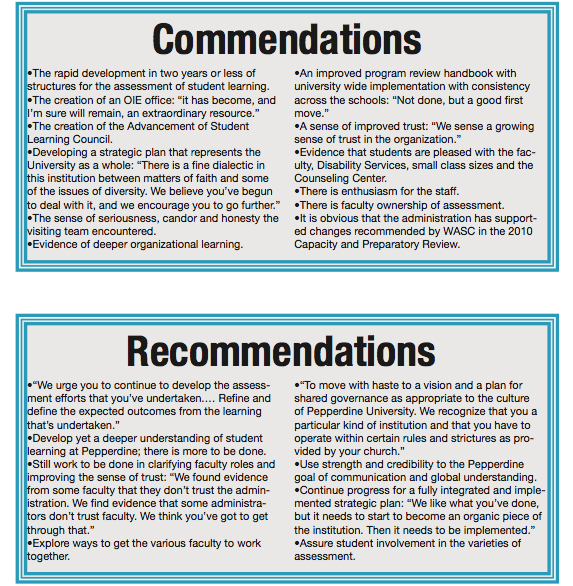Administration and faculty let out a collective sigh of relief as the Western Association of Schools and Colleges (WASC) visiting team left campus Friday afternoon. Though the review process is over, faculty and administrators remain wondering if the university can continue the progress it’s made in the past two years.
WASC, one of six agencies responsible for the accreditation of Pepperdine, just completed its three-part review that spanned over the last four years.
The tone of Friday’s closing address put the changing debate on higher education in context for Pepperdine and its future.
“There are some forces loose, it seems to be, in our American culture that are difficult to predict and manage . . . I worry for you and other universities,” said Team Chair Curtis L. McCray at the Exit Interview. “At my age and experience I have an apocalyptic feeling about higher education, and if apocalyptic is the wrong word then I have a feeling of crisis — a more neutral term for change. And I have a hunch that getting ready for that change is what we’re going to have to do.”
On Friday, President Andrew K. Benton closed the visit by acknowledging, “we know we’re not done.” He then brought the focus back onto the students:
“It’s not abut the visiting team or WASC or about administrators; this is about [the students], and making teaching and learning as effective as it can be throughout the university and all five of the schools. They’re first and foremost in the details of this report and in the hopes and dreams of this institution.”
Preparing for the Educational Effectiveness Review (EER) report meant that Pepperdine’s five schools had to collaborate on a single university plan.
The three-part process began in 2008 with an Institutional Proposal and followed by the 2010 Capacity and Preparatory Review and the 2012 EER. The closing preparations have submitted to educational outcomes as recommended by WASC.
“I would observe, in general, that the schools have learned a lot more about each other during this time than we knew in the past,” said Professor Bob McQuaid of the Graziadio School of Business and Management. McQuaid is also the chair of the University Faculty Council (UFC) and said he wasn’t surprised by the closing session. Instead, he’ll be more interested the final report.
“So, while they observed that we’ve made progress, there remains much work to be done. I think faculty believe that pursuing shared governance will be a long and challenging process requiring some critical introspection by the schools, the faculty and the administration. The question seems to be if we are capable to successfully navigate that process.”
Soon, the commission will discuss what the visiting committee has recommended for the number of years until the next WASC visit is required.

